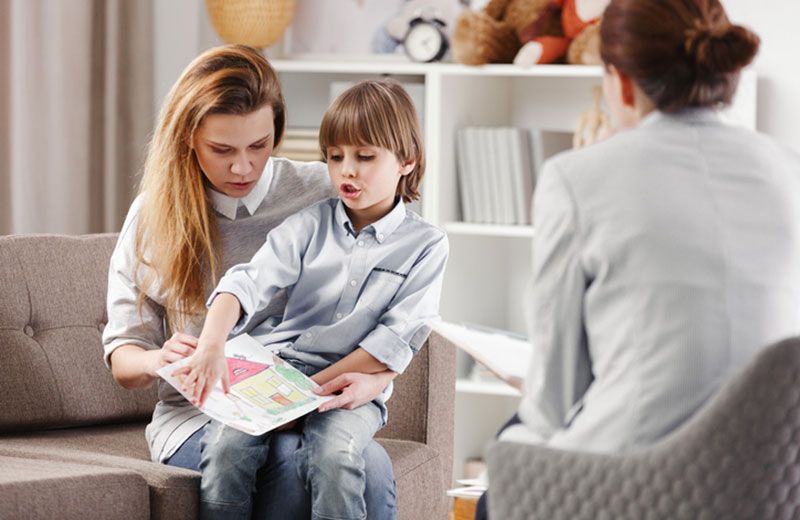Children go through numerous emotional, social, and psychological stages as they grow, and it is normal for them to experience occasional distress or frustration. However, sometimes these struggles may become overwhelming, and without proper guidance, they can persist, negatively impacting a child’s overall well-being. As parents and caregivers, recognizing when your child may need professional help is crucial to their emotional and psychological growth.
Child therapy can provide valuable support during difficult times, teaching children coping mechanisms, communication skills, and emotional regulation. Understanding the signs that your child might benefit from therapy can help ensure they receive the help they need before issues become more entrenched. In this article, we will explore when to seek child therapy and highlight key signs that indicate your child may require professional support.
Why Child Therapy Matters
Child therapy is a specialized form of mental health care designed to help children express their feelings, understand their thoughts, and manage challenging emotions. Therapists work with children in ways that are appropriate for their age and developmental stage, using a variety of therapeutic techniques such as play therapy, cognitive-behavioral therapy (CBT), and art therapy.
Therapy can help children cope with a wide range of issues, including anxiety, depression, behavioral problems, family conflict, and trauma. Seeking therapy for your child at the right time can prevent emotional difficulties from escalating and provide them with essential skills for managing their emotions and behaviors as they grow.
Signs Your Child May Need Professional Help
It can be challenging to determine when a child’s behavior or emotional state crosses the line from normal to something that may require professional intervention. Below are some common signs that may indicate your child would benefit from therapy:
1. Persistent Mood Changes
It’s normal for children to experience a range of emotions as they grow, but if your child is consistently sad, irritable, anxious, or angry for an extended period, this may signal that they need professional help. Persistent mood swings that affect their ability to function at home, school, or in social situations are a cause for concern. Symptoms of depression, anxiety, or other emotional challenges often manifest in children as mood changes, and if left unaddressed, they may worsen over time.
Signs of persistent mood changes may include:
- Tearfulness or crying without an obvious cause.
- Lack of interest in activities that once brought joy.
- Extreme irritability or frequent temper tantrums.
- Difficulty engaging with others or isolating themselves from family and friends.
2. Severe Behavioral Changes
Children typically exhibit a range of behaviors as they explore their independence, but drastic or sudden shifts in behavior can indicate deeper issues that need to be addressed. If your child is acting out in ways that are uncharacteristic, such as being excessively aggressive, disobedient, or engaging in harmful behavior, therapy may help uncover the root cause.
Behavioral changes that may signal the need for therapy include:
- Frequent outbursts of anger or rage.
- Aggression toward others, including peers, siblings, or even pets.
- Regressive behaviors, such as bed-wetting, thumb-sucking, or clinging.
- Lying, stealing, or other actions that seem to go against previously established values or behavior.
3. Decline in Academic Performance
School can be a challenging environment for many children, but if your child begins to show a significant decline in academic performance, it may be a sign that something is affecting their emotional or mental health. Struggles with concentration, motivation, or learning can be linked to anxiety, depression, or stress, all of which may benefit from therapeutic intervention.
Signs of academic distress may include:
- Sudden or unexplained drop in grades.
- Complaints of feeling overwhelmed or unable to keep up with schoolwork.
- Lack of interest in school activities or projects.
- Difficulty concentrating or staying focused during lessons.
4. Withdrawal or Social Isolation
Children are social beings, and it’s normal for them to have ups and downs in their friendships and social interactions. However, if your child starts to isolate themselves, refuse invitations to play with friends, or avoid family gatherings, this may signal deeper emotional distress. Social withdrawal is often a coping mechanism for children struggling with anxiety, depression, or trauma.
Signs of withdrawal and isolation include:
- Refusal to participate in social activities or interact with peers.
- Avoiding family events, parties, or outings.
- A general disinterest in forming friendships or playing with other children.
- Lack of eye contact or avoidance of social situations.
5. Difficulty Coping with Change or Stress
Children, like adults, can have difficulty adjusting to major life changes, such as moving to a new home, losing a pet, experiencing parental separation, or dealing with the death of a loved one. However, if your child seems to be unable to cope with stressors or changes in their life, therapy can provide them with tools to manage their emotions in healthy ways.
Signs that your child may be struggling with change or stress include:
- Excessive worry or fear about new situations or changes.
- Complaints of stomachaches, headaches, or other physical symptoms linked to stress.
- Trouble sleeping, nightmares, or an increased need for comfort from caregivers.
- Acting out behaviors, such as refusing to go to school or avoiding social situations.
6. Excessive Worry or Anxiety
Anxiety is a common issue for many children, but if your child is experiencing excessive worry, fear, or nervousness that interferes with their daily life, therapy may help them gain control over these emotions. Anxiety can manifest in many ways, from fears of separation to worries about school performance, health, or social acceptance.
Signs of excessive anxiety in children include:
- Persistent fears or worries about things that don’t seem to bother other children.
- Avoiding certain activities or situations due to fear (e.g., refusing to go to school or attend social events).
- Excessive clinging or separation anxiety, especially with parents or caregivers.
- Trouble sleeping due to worry, nightmares, or restlessness.
7. Trauma or Loss
Children who experience traumatic events, such as the death of a loved one, divorce, bullying, or physical or emotional abuse, may struggle to process their feelings on their own. Therapy can provide a safe space for children to process their trauma and learn to heal.
Signs of trauma in children include:
- Nightmares or difficulty sleeping.
- Regressive behaviors, such as bed-wetting or baby talk.
- Hypervigilance, including being easily startled or overly fearful.
- Withdrawal, irritability, or an inability to talk about the traumatic event.
8. Physical Symptoms without a Clear Cause
Children may experience physical symptoms such as stomachaches, headaches, or fatigue when they are stressed or emotionally distressed. If medical professionals can’t find an underlying physical cause, it may indicate that the child’s emotional health is being impacted. Addressing these symptoms through therapy can help alleviate the physical manifestations of emotional distress.
Conclusion
As a parent or caregiver, it’s important to recognize when your child may benefit from professional help. While some challenges are a normal part of growing up, others may require specialized intervention to prevent further emotional or behavioral issues. If your child exhibits persistent mood changes, behavioral problems, academic struggles, or difficulty coping with life stressors, seeking therapy can provide them with the tools they need to navigate their emotions and build resilience for the future.
Child therapy can offer children the support they need to work through difficult emotions, build coping strategies, and develop a healthier mindset. Early intervention can make a significant difference in your child’s emotional and psychological well-being, setting them on the path to growth and healing. If you notice any of the signs mentioned above, consider reaching out to a licensed child therapist to help your child thrive emotionally.










